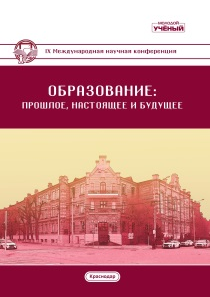Physical and mental health of Russian schoolchildren during a pandemic
Авторы: Величко Елена Владленовна, Макарова Наталья Эдуардовна
Рубрика: 1. Общая педагогика
Опубликовано в
Дата публикации: 27.12.2020
Статья просмотрена: 15 раз
Библиографическое описание:
Величко, Е. В. Physical and mental health of Russian schoolchildren during a pandemic / Е. В. Величко, Н. Э. Макарова. — Текст : непосредственный // Образование: прошлое, настоящее и будущее : материалы IX Междунар. науч. конф. (г. Краснодар, январь 2021 г.). — Краснодар : Новация, 2021. — С. 1-4. — URL: https://moluch.ru/conf/ped/archive/385/16284/ (дата обращения: 27.07.2024).
Across the world, due to the spread of coronavirus disease (COVID-19), children are affected by physical distancing, quarantines and nationwide school closures.
Some children and young people may be feeling more isolated, anxious, bored and uncertain. They may feel fear, and grief, over the impact of the virus on their families. This article describes a study of changes in the physical and mental health of Russian schoolchildren during a pandemic. The study explored adolescents’ moods, emotions, and feelings, with attention to expectations for the immediate future.
The world is in a state of panic due to the coronavirus (COVID-19) and it's natural to feel overwhelmed and stressed by it all but know you’re not alone.
All over the world, people of all ages from high school and university students through to the elderly are going through the same thoughts of uncertainty and anxiety [1,2].
Therefore, the purpose of the study that we conducted among adolescents in Astrakhan is to study the emotional state of adolescents during a pandemic.
Assigned tasks:
– Conducting a peer survey about their emotional state during a pandemic.
– Selection of the most optimal ways to solve the identified problems.
Research hypothesis: The Connecting with friends and family would be vital in maintaining good mental health as the pandemic continued to impact our daily lives.
When a new disease emerges, there is the possibility of a pandemic, which is worldwide spread of the disease. There have been multiple pandemic and epidemic outbreaks in recent history, including the 1918 influenza pandemic, the 2003 SARS-CoV outbreak, and most recently, the COVID-19 pandemic.
There are things we can all do to prepare for a possible pandemic outbreak, and it’s important that we all follow the appropriate steps to slow or stop the spread of the new disease [3.].
We conducted a survey of thirty adolescents aged 14–15 who were in self-isolation between April and July 2020. They answered the following 8 questions:
- What do you think: your knowledge is worse during quarantine?
- Have you stopped observing the daily routine?
- Have you stopped carefully monitoring your appearance?
- Did you play computer games more often during the pandemic?
- Have you put on weight?
- Are you irritable?
- Is your physical health worse?
- Have you missed communication with your friends, feeling isolated from their social groups, especially with the cessation of sports and extracurricular activities?
Participation was voluntary, and the questionnaire required approximately 10–15 min to complete.
We got the following results: We found that half of the respondents complain of a decrease in intelligence. The other half believe that they have improved their intellectual level through reading books.
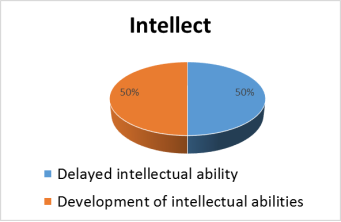
30 % (9 persons) observed the daily regimen. 60 % (18 persons) did not use cosmetics and perfumery. It is striking that all of the respondents played computer games more often than before the quarantine.
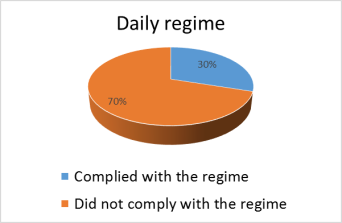
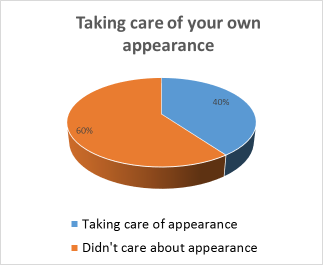
20 % (6 people) ate more and gained weight. 86.6 % (26 people) became irritable. 50 % (15 people) felt weak. 83.3 % (25 people) felt bored.
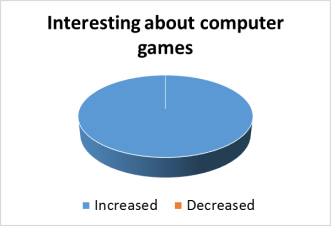
The majority of the adolescents interviewed said they had more homework than before due to the remote school activities, and a significant percentage of them reported having little free time. However, a large percentage was coping with quarantine by dedicating at least 1 h a day to a hobby, watching television.
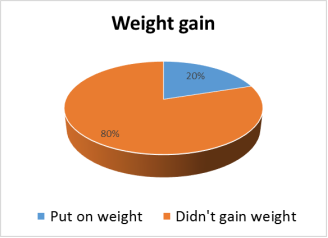
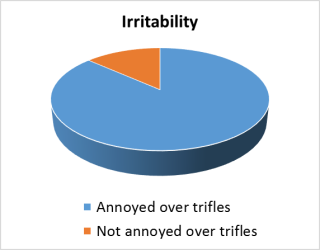
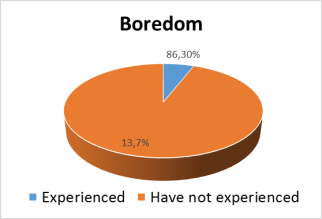
This study has several social and psychological implications. In particular, the results underline that the COVID-19 emergency has undoubtedly had a significant impact on the lifestyle and psychological well-being of Russian adolescents. In light of these findings, the physical and mental impact of the COVID-19 epidemic on children and adolescents is a matter of fundamental importance both for governments and families and cannot be neglected, especially in this phase of a progressive resumption of ordinary life [4]. Therefore, it is necessary to prepare adequate strategies to support the youth population in addressing the uncertainty associated with the pandemic and the quarantine period to reduce the psychological impact of school closures and home confinement as much as possible and guarantee adequate support to deal with the return to school [5].
References:
- Харламенкова Н. Е. Интенсивные стрессоры и психологические последствия их переживания в молодости и ранней взрослости.// Изд. Вестник Костромского государственного университета. Серия: Педагогика. Психология. Социокинетика. № 4. 2017. — С.26–30
- Тарабрина Н. В. Посттравматический стресс и картина травматических событий в разные периоды взрослости/ Н. В. Тарабрина, Н. Е. Харламенкова, Ю. В. Беховец, Л. Ш. Мустафина, О. А. Ворона, Н. Н. Кызымова// Психологический журнал.2016.-Т.37.- № 6.- С.94–108.
- Федосенко Е. В. Жизнь после карантина: психология смыслов и коронавирус COVID-19.// Материалы XXV Международного симпозиума «Психологические проблемы смысла жизни и акме»// Изд. Психологический институт РАО. Москва, 15–16 апреля 2020. — С.35–48.
- COVID-19 Pandemic: Youth Engaged in the NextNormal [Electronic resource] / UNESCO. 08.12.2020// − Режим доступа: https://en.unesco.org/news/covid-19-pandemic-youth-engaged-nextnormal
- Boudreau Emily. Supporting Teenagers in a Pandemic. Six ways families and schools can foster adolescent development [Electronic resource]/August, 27,2020. — Режим доступа: https://www.gse.harvard.edu/news/uk/20/08/supporting-teenagers-pandemic






